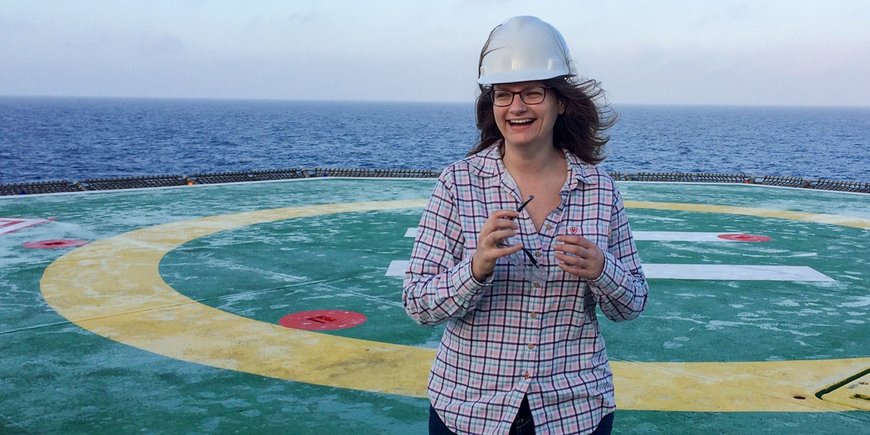Ann Cook is a guest of the Gas Hydrate Research Group in Section 3.1 Inorganic and Isotope Geochemistry with a Humboldt Research Fellowship for experienced researchers. The scholarship enables her to stay at the GFZ for 13 months spread over two years.
With the Humboldt Research Fellowship for experienced researchers, the Alexander von Humboldt Foundation sponsors researchers with above-average qualifications from all over the world. Supported with 3,170 euros per month, they can realise their research project in Germany. The fellowship can be applied for between 6 and 18 months and divided into up to three stays within three years.
Ann Cook is a professor at Ohio State University in the United States. Her scientific interest lies in the characterization and assessment of natural gas hydrate deposits to understand gas hydrate as a component of the global carbon cycle and as a potential resource. She uses well logs, seismic data, core data and numerical models to understand gas hydrate systems. During her stay at the GFZ, she will conduct experiments together with Erik Spangenberg (Section 4.8) and Judith Schicks (Section 3.1) to determine the petrophysical properties of hydrate-bearing sediments.
Ann Cook studied geology at Columbia University in New York - including positions in industry - and also received her doctorate there. After a post-doctoral period at the Lamont-Doherty Earth Observatory of Columbia University (Borehole Research Group), she has been an assistant professor at Ohio State University in Columbus since 2012 and an associate professor since 2018. Ann Cook has received several awards, including the Japan-American-German Frontiers of Science Fellowship (2019, National Academy of Science), Frontiers of Science Kavli Fellowship (2019, National Academy of Science) and the CAREER Award (2018, National Science Foundation).








![[Translate to English:] Torsten Sachs in front of a climate station on a field](/fileadmin/_processed_/3/9/csm__TorstenSachs_bearbeitet_GS_4a1365ef84.jpeg)

![[Translate to English:] left image flood at the Ahrtal: image from above, several houses are flooded; left image:: Heidi Kreibich;](/fileadmin/_processed_/4/4/csm_Bild2_9af0130e9f.png)



![[Translate to English:] Start der Vega Rakete](/fileadmin/_processed_/6/4/csm_20231201-kachel_Vega-VV23-launch_ESA-CNES-Arianespace_706716b68c.jpeg)









![[Translate to English:] Poster exhibition at the Brandenburg Hydrogen Day at the GFZ, some participants in the foreground](/fileadmin/_processed_/6/5/csm_Erster_Brandenburgischer_Wasserstofftag_GFZ_402fcec95e.jpeg)
![[Translate to English:] Group picture of the participants](/fileadmin/_processed_/9/4/csm_20231108_CAWa-Workshop-Tashkent_Gruppenbild_99ea779d8a.jpeg)

![[Translate to English:] [Translate to English:] Hörsaal](/fileadmin/_processed_/e/6/csm_H%C3%B6rsal_e21ac645fb.jpeg)


![[Translate to English:] The Delegations in the Historic Library on the Telegrafenberg. In the back there are from left to right, the Dutch Ambassador for Germany, Ronald van Roeden, the Dutch Minister for Education, Culture and Science, Robbert Dijkgraaf and the scientific director of the GFZ, Susanne Buiter.](/fileadmin/_processed_/d/b/csm_Kachel-2_9eba4b4212.jpeg)

